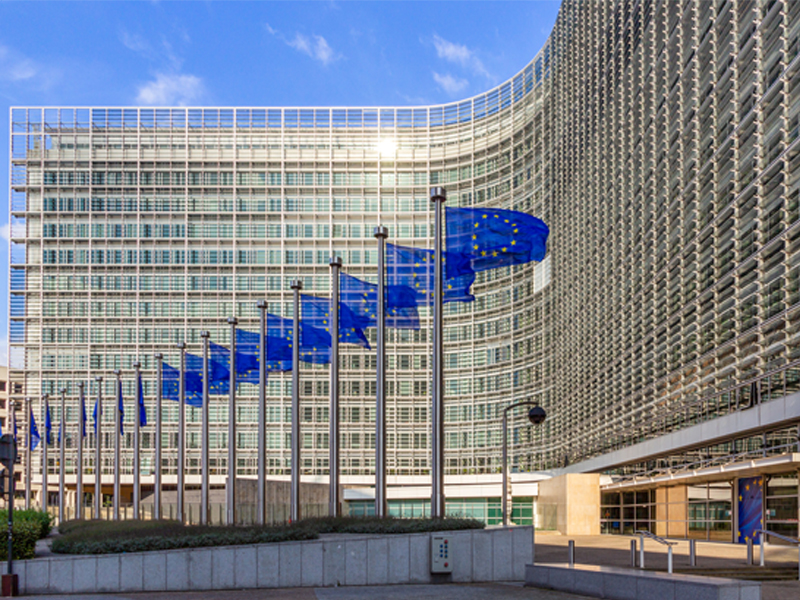
Authors
-
Charlotte Bancilhon
Former Director, Sustainability Management, BSR
-

Manager, Transformation, BSR
Key Points
- Under the Corporate Sustainability Reporting Directive (CSRD), all large, all listed, and some non-EU companies will be required to report sustainability information against mandatory European Sustainability Reporting Standards.
- The CSRD falls nothing short of a revolution. The new requirements will have implications on how companies track, account for, and disclose their sustainability risks, opportunities, and impacts.
- Investors and other report users, who have been operating in a context of sustainability data scarcity, will now have access to more consistent sustainability information.
In the fast-changing landscape of sustainability reporting, the EU emerges as a front-runner. And in doing so, it is making a crucial impact not only in Europe but across the world. The EU has set an ambitious path to reorient capital flows toward a sustainable economy while avoiding greenwashing, and it has introduced far-reaching legislation, such as the Sustainable Finance Disclosure Regulation and the EU Taxonomy. To support the EU’s goals, investors need quality and comparable data from companies.
This is where the Corporate Sustainability Reporting Directive (CSRD) proposal comes in.
After a year of negotiations, the EU Council and EU Parliament reached a provisional agreement on June 30. The CSRD is set to replace the Non-Financial Reporting Directive (NFRD). The name change is welcome, highlighting that sustainability topics are also financial topics rather than opposed to them. Ultimately, sustainability information should be considered as important as financial information.
The CSRD is not just about meeting investor needs. It will also enable civil society organizations, trade unions, and other stakeholders to assess companies’ impacts on society and the environment.
Here are six points that businesses should know about the CSRD:
1. More companies will be covered by the CSRD than the NFRD.
All large companies governed by the law of or established in an EU member state and all European stock exchange-listed companies (except micro-companies), as well as small and medium-sized enterprises (SMEs), are under the scope of the new directive.
A large company is defined as meeting two out three of the following criteria: (1) EUR€40 million in net turnover, (2) EUR€20 million on the balance sheet, and (3) 250 or more employees.
Companies that are not established in the EU but have securities on EU-regulated markets are also in scope.
For non-European companies, the requirement to report sustainability disclosures applies to all companies generating a net turnover of EUR€150 million in the EU and which have at least one subsidiary or branch in the EU.
2. The CSRD proposal applies double materiality.
Double materiality means that businesses must not only disclose how sustainability issues can affect the company ("impacts inward") but also how the company impacts society and the environment ("impacts outward"). For businesses that have historically assessed only risks to their business rather than their impacts on the world, the CSRD implies a fundamental shift in measurement and reporting.
3. Companies will need to report according to new EU sustainability reporting standards.
The European Commission has commissioned the European Financial Reporting Advisory Group (EFRAG) to develop EU sustainability reporting standards (ESRS). The standards will be mandatory for large companies. EFRAG released a draft for public comment in April. BSR encourages its members and the general public to provide feedback on the exposure drafts ahead of the August 8 deadline.
The standards seek to align to the extent possible with global standard-setting initiatives such as GRI and the ISSB Standards, but they also aim to link other EU legislation and initiatives, such as the Sustainable Finance Disclosure Regulation, the EU Taxonomy, among others.
SMEs and non-EU companies will have separate standards.
4. Third-party assurance of the data will be mandatory.
Businesses will be required to seek "limited" assurance of the sustainability information by a statutory auditor. Individual member states may choose to allow other independent assurance service providers (IASP) or non-statutory financial auditors to perform the assurance. Although "limited" assurance still requires an auditor to evaluate the information, it falls short of what is required for the financial audit statement. The EU Commission will adopt standards for "reasonable" assurance by October 2028, which is a more demanding assurance process.
5. Sustainability information must be included in the management report and digitally tagged.
Companies will need to report sustainability information in a dedicated section of the management report rather than in a separate report (i.e., a standalone sustainability report). This means that financial and sustainability information will be published at the same time and that the administrative, management, and supervisory bodies will be accountable for this reporting. Companies will also need to digitally tag sustainability information so that it can be fed into the European single access point database.
When it comes to reporting at a consolidated level versus entity level, the subsidiary exemption will not apply in the case where the subsidiary is listed on an EU stock exchange.
6. CSRD application will be phased in.
The European Commission plans to adopt the final text of the CSRD in late 2022, after which member states will have 18 months to translate the directive into local law. The first companies that will need to comply to the Directive are companies that are currently within scope of the NFRD. They will need to report in 2025 based on fiscal year (FY) 2024 data.
- August 8, 2022: The public consultation of the sector-agnostic ESRS ends.
- November 2022: EFRAG proposes sector-agnostic standards to the EU Commission.
- June 2023: The EU Commission adopts sector-agnostic standards through delegated acts.
- January 1, 2024: The CSRD will come into force. Companies already in scope of the NFRD will need to report in 2025 based on FY 2024 information.
- June 2024: The EU Commission will adopt sector-specific standards, standards for listed SMEs, and standards for non-EU companies.
- January 1, 2025: Other large companies need to report in 2026 based on FY 2025 information.
- January 1, 2026: Listed SMEs need to report in 2027 based on FY 2026 information.
- January 1, 2028: Non-EU companies in scope will need to report in 2029 based on FY 2028 information.
The ESRS standards developed via the CSRD will create a baseline for decision-useful information to both investors and stakeholders at large, and the sustainability reporting standards can both increase the impact of disclosure and reduce the burden of reporting on companies.
At BSR, we have supported greater harmonization and clarity in the field of sustainability reporting for a long time. Competing standards and diverging requests for sustainability information from stakeholders have created an unreasonable burden and reporting fatigue for companies, hindering the effectiveness and impact of reporting. We will continue to push for progress on that front, building on the leadership displayed by the EU.
It is essential that the evolution of these standards reflects the voice of report preparers, so we encourage companies to play an active part in the EU sustainability reporting standard-setting process. If you would like to discuss this topic further, please reach out to our Future of Reporting collaborative initiative.
Topics
Collaborative Initiatives
Let’s talk about how BSR can help you to transform your business and achieve your sustainability goals.







